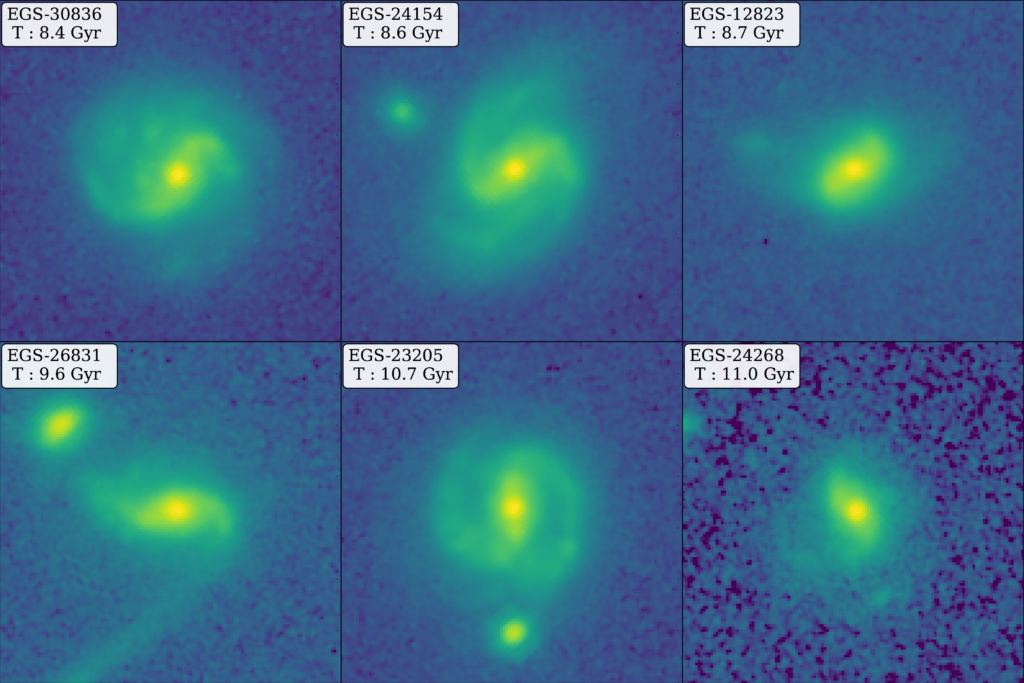For the first time this week, photos from the James Webb Space Telescope (JWST) revealed that stellar bars were present in some galaxies as far back as 11 billion years ago. Stellar bars are a defining feature of about two-thirds of all spiral galaxies in the Universe, including our own Milky Way. The discovery has implications for astronomers’ understanding of galactic evolution, indicating that bars form very quickly and may persist for much of a galaxy’s lifespan, influencing its shape and structure.
Stellar bars are regions of intense star formations that radiate out from a galaxy’s core. Through the motion of inner orbiting stars, dust, and gas clouds, they build up as a wave of dense material that perpetuates itself and spreads slowly outward while pulling raw material inwards. These regions become stellar nurseries that churn out new stars at a rapid pace.
 Six barred galaxies as seen by JSWT, as they would have looked in the early universe, between 8.4 and 11 billion years ago (Gyr). Credit: NASA/CEERS/University of Texas at Austin.
Six barred galaxies as seen by JSWT, as they would have looked in the early universe, between 8.4 and 11 billion years ago (Gyr). Credit: NASA/CEERS/University of Texas at Austin.The new JWST images, presented by The University of Texas at Austin on January 5th, show six barred spiral galaxies over 8.4 million years old, two of which are older than 11 billion years (the oldest galaxy ever seen is around 13.4 billion years old).
Most of these galaxies were previously imaged by the Hubble Space Telescope, like EGS-23205, pictured below. (EGS stands for Extended Groth Strip, a region of the sky that has been extensively images and studied by international surveys). However, in the Hubble images, the bars are largely obscured.
 Galaxy EGS23205, as seen by Hubble (left, taken in the near-infrared filter), and JWST (right, mid-infrared image). Credit: NASA/CEERS/University of Texas at Austin.
Galaxy EGS23205, as seen by Hubble (left, taken in the near-infrared filter), and JWST (right, mid-infrared image). Credit: NASA/CEERS/University of Texas at Austin.JWST has an advantage over JWST in observing extremely old and distant galaxies, partly because its larger mirror can collect more light from distant, dim objects. But it also has an advantage due to its use of infrared rather than optical wavelengths. Light from older and more distant objects is ‘red-shifted’ along the electromagnetic spectrum, meaning that JWST’s detectors can pick them up better than Hubble can.
Infrared is also very effective at seeing through gas and dust, enabling JWST to pick out the stellar nurseries in the bars which would otherwise be obscured.
Shardha Jogee, professor of astronomy at The University of Texas at Austin, explained the implications of these early forming bars for models of galactic evolution:
 The location of the Extended Groth Strip (EGS) in the night sky. The galaxies newly observed by JWST lie within the EGS. Image Credit: NASA, ESA, M. Davis (University of California, Berkeley), S. Faber (University of California, Santa Cruz), and A. Koekemoer (STScI).
The location of the Extended Groth Strip (EGS) in the night sky. The galaxies newly observed by JWST lie within the EGS. Image Credit: NASA, ESA, M. Davis (University of California, Berkeley), S. Faber (University of California, Santa Cruz), and A. Koekemoer (STScI).“Bars solve the supply chain problem in galaxies,” Jogee says. “Just like we need to bring raw material from the harbor to inland factories that make new products, a bar powerfully transports gas into the central region where the gas is rapidly converted into new stars at a rate typically 10 to 100 times faster than in the rest of the galaxy…This discovery of early bars means galaxy evolution models now have a new pathway via bars to accelerate the production of new stars at early epochs.”
The new images are part of the Cosmic Evolution Early Release Science Survey (CEERS), and their initial findings have been accepted for publication in The Astrophysical Journal Letters.
JWST is ushering in an exciting time for astronomers, and this was a promising start to 2023.
“I took one look at these data, and I said, ‘We are dropping everything else!’” says Jogee.
Learn more:
“James Webb Telescope Reveals Milky Way-like Galaxies in Young Universe,” UT Austin.
Yuchen Guo et al., “First Look at z > 1 Bars in the Rest-Frame Near-Infrared with JWST Early CEERS Imaging,” ArXiv Preprint.

